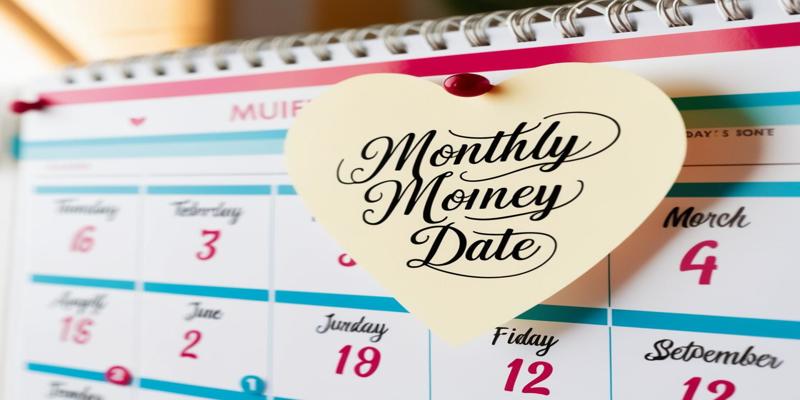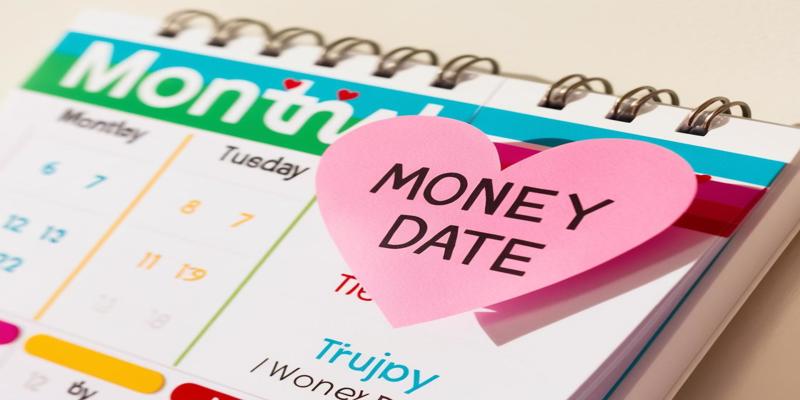
What is a Money Date and Why You Should Plan One Now
Nov 18, 2024 By Susan Kelly
Hey, frugal friend! Ever feel like your money's just all over the place? Well, let me assure you, we've all been there. But let me tell you this: imagine if I told you there was a straightforward way to get your money game right? Enter the monthly money date. No, it is not some strange financial speed-dating thing. It's a regular meeting with your wallet that'll make you feel like a boss in no time.
What is a Monthly Money Date?

A monthly money date is a set time every month when you and your partner sit down to discuss your finances in a focused, intentional way. It's not only about cranking through the numbers; it's an opportunity to ensure you're on the same page regarding what you want to achieve, celebrate successes, and deal with challenges together.
The Basics of a Money Date
Think of your Monthly Money Date as a financial check-in with a twist. In the words of Marriage Kids and Money, it's time to go over finances, talk about goals, and plan for the upcoming month. Now, let's not be misled by the word "date," per se, since this has nothing to do with the conventional romantic night out. Instead, it is how you may strengthen your relationship through open financial communication.
Why You Need a Finance Date Night
Setting a Monthly Money Date is essential for several reasons: First, it provides a controlled environment to tackle money issues without the pressure of everyday stressors. According to Fun Cheap or Free, discussing money in passing is usually ineffective and causes more tension than is needed. You're more likely to be able to make progress with where you want to go because you've carved out specific time for your finances.
Why You Should Set Aside Time for a Monthly Money Date
Foster Financial Harmony
The Monthly Money Date with your spouse is not about organizing numbers; it's all about building a financial relationship. Talking about money together is a proactive investment in the future as a couple. Regular check-ins can foster trust, improve communication, and ensure that you're both on the same page with your money.
Stay on Top of Your Finances
A Finance Date Night isn't just for couples having money issues. It is a proactive way of managing your wealth. Ongoing money dates keep you on top of your ever-changing financial situation and make sure your budget meets your current lifestyle. You will catch any possible issues well before they become problems, and you can celebrate financial wins together.
Achieve Your Goals Faster
When you invest the time in a financial check-in, you are much more likely to achieve goals. Writing down your top shared financial objectives and putting them somewhere where you can see them works wonders for staying on track and motivated. Use your Money Date to track progress, adjust strategies, and keep each other accountable.
Reduce Financial Stress
Having a committed "financial date night" to discuss money regularly can be a game-changer. It takes some pretty fighting Words and makes them organized and constructive conversations. The more you talk about money in a positive setting, the less anxiety there will be, and the better your relationship will be.
How to Have an Effective Money Date

Set the Stage for Success
Set the scene for a successful Monthly Money Date by setting the mood and setting. Schedule a regular "money date" with your spouse by blocking out time on your calendar and treating it as a priority. Make it fun: order food or drink, or pick a relaxed setting. And just like that, what could be a source of stress becomes a fun activity both will look forward to.
Review and Plan Together
On your Finance Date Night, discuss your current financial situation, including what comes in, what goes out, what debts are owed, and what you have in savings. Then, set a budget together that meets your shared goals. Take this time to discuss upcoming events and plans and any financial fears.
Money Date Discussion Topics and Checklist
Setting a Monthly Money Date is all about open communication and shared financial goals. To make the most of your Finance Date Night.
Review Your Financial Health
First, take a close look at your financial situation. As Ellevest puts it, the only thing considered fair in chipping in to cover such expenses is contributing, with each person paying their percentage of the total household income. It would be worth discussing income and expenses so that you understand where you save and where you need to save more.
Set Goals and Priorities
Discuss your short and long-term financial goals: Are you saving up for a dream home, or do you want to travel? Take a cue from Brides.com and discuss whether you consider yourself more of a spender or saver and what you feel is worth spending on versus saving for.
Plan for the Future
Use your Monthly Money Date to plan for upcoming expenditures and life transitions. You might want to discuss:
- How you will handle debt
- Where to invest
- How much to put in an emergency fund
- How to plan for retirement
Making the Most of Your Monthly Financial Check-in
Set the Stage for Success
Your Monthly Money Date is much more than crunching numbers; you will get to take control of your financial future. Decide on a regular time, such as every last Sunday, to make it consistent. Make it as enjoyable as possible to enhance productivity on this Finance Date Night by creating an atmosphere devoid of distractions and adding a cup of your favorite drink to complete it.
Review and Refresh
Begin your financial check-in by assessing your progress toward goals set during previous sessions. Carefully examine what you have spent money on and where improvements could be made. Next, reassess your budget to adjust for any changes in income or expenses.
Plan for the Future
Use your Money Date to set new financial goals or refine existing ones. Consider setting aside 5-10% of your monthly income in a separate savings account. Plan upcoming expenses by creating savings pots for irregular costs and budgeting for treats and one-off purchases.
Conclusion
So, in a nutshell, that's what you need to know to set up your monthly money date. Setting aside this time to check in on your finances means taking a giant step toward your goals. Remember: It doesn't have to all be about spreadsheets and budgets.
-
 Banking Jan 21, 2024
Banking Jan 21, 2024How an Auto Loan Grace Period Can Save You From Late Fees?
Learn about Auto loan grace periods and how to use them wisely. Get all the information you need to stay on top of your car loan payments.
-
 Banking Oct 24, 2023
Banking Oct 24, 2023Mentioning the Best Credit Cards for Large Purchases
Although utilizing a credit card for a loan isn't typically recommended, there are situations in which doing so could benefit you, such as when making a sizable purchase. Choosing the correct card for your spending habits is essential. Credit cards with introductory 0% APR offer, generous sign-up bonuses, and ongoing cash-back incentives are all solid options.
-
 Banking Nov 22, 2023
Banking Nov 22, 2023Lump-Sum Distribution
A lump-sum distribution can be described as a financial phrase typically referring to the option to take the 401(k) policy or pension in one-time payments for the total amount. Instead of receiving the benefits through retirement, you can take the entire policy in one go.
-
 Mortgages Feb 14, 2024
Mortgages Feb 14, 2024How to Handle an Underwater Mortgage
When you have an underwater mortgage—also referred to as an upside-down mortgage—you owe extra on your house than it is now valued. Your property cannot be sold for enough money to cover the mortgage balance if you are underwater. The term "underwater mortgage" refers to a situation in which the value of the house is lower than the amount still owed on the mortgage.